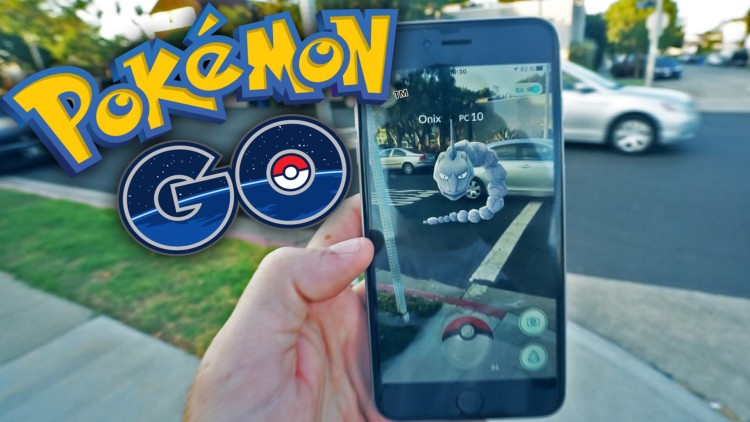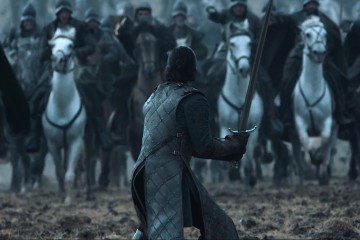Pokemon Go: Great Gaming

In our social media sphere, the reaction to virtually every news story is strangely predictable. It begins with hype, enthusiasm, and support OR knee-jerk disdain and contempt. Then, contrarians rally against that initial reaction. Pokemon GO seems to have captured that see-saw of opinion quite nicely, but has the additional bonus of making one of my favorite subjects mainstream: pop culture and gaming. I previously wrote about how gaming/football drove some of fiction in The Great Game. Without getting deep into the plot of Game On, Game Over, or the rest of my series, I think gaming and gamification will continue to impact our lives. The unanswered question is whether this is a positive or negative.
Pokeman Go in the Wild
Pokemon Go has inverted the video gaming stereotype. It tears people away from computers, requires physical activity, and implicitly pushes actual social interaction. I’ve watched folks from all different walks of life feverishly swiping at their touchscreen, tossing pokeballs. I watched a boy with his mother feverishly grab her arm and jump with joy. They waited while he caught a Pokemon. After it was done I asked, “Did you get him?” The boy was startled and said yes. The mother was amused.
Pokemon Go became such a sudden and overwhelming phenomena that it is, for the summer of 2016, a cultural touchstone. When confronted with toxic online argument argument culture, a bewilderingly partisan political season, and a bevy of simmering tension something broadly relatable is startlingly refreshing. People enjoying public space, interacting, and exercising together is an amazing thing. The cause is not common sense or rational understanding of the benefits of exercise and community. Its Pokemon Go.
However, with any new technology or trend, the unexpected societal force causes friction with established social order. Players may not consider the consequences of their frenzied Pokemon hunts. Others may not be prepared for the sudden change in behavior from the general public. That’s normal for big changes. Just try to imagine what it must have been like seeing a car when you spent decades using a horse. People still struggle with one element mightily with this change. Why is everyone so excited about a stupid game? So for every story of someone trespassing, squabbles of Pokemon, or real life clashes over gym supremacy consider how many more interactions occur that are individually unworthy of news. The tension makes headlines and generates clicks while the more typical interactions do not unless considered in large aggregates. And large ideas are a lot harder to write about then all-too-human foibles.
In some ways Pokemon Go is underwhelming as an innovation. Pokemon Go won’t change the amount of time it takes to travel. However, it may incentivize healthy habits in our world where we our frighteningly free to kill ourselves by a thousand cuts of modern convenience. Nintendo could have released a GameBoy style installment for phones, but they did not. They did something new to the masses (yes, I know it’s been done before) and merged it with an IP with a built-in fan base that catered perfectly to the style of play. Leveling up requires walking and going places. You plainly see other people playing. You do things that help other players collect their Pokemon as well. Face to face, in these fleeting encounters I witnessed, I never saw anyone spewing bile like an internet comment section. Anecdotal, yes, but maybe a step in the right direction.
Is It Actually Any Good (And Does That Matter?)
I play Pokemon Go. I’ve enjoyed it. However, it’s not a good game. The two largest gameplay elements are physically moving yourself in real life to a place where you can catch Pokemon, get supplies, or fight Pokemon. So, basically, following a map and moving in real life. Next, you flick your screen trying to throw a ball, a simple dexterity exercise and quite mundane. The battling is standard JRPG fare. On the back end, you gather supplies and make decisions for upgrading and improving your Pokemon and managing your inventory.
In truth, every single element of the game is worn, but doesn’t need to innovative play. It does all of this inside of an augmented reality package. Real life is part of the game and that trumps all the well-founded critiques. Showing business people of all ages that Pokemon were loose on the golf course with them proved to me that my pretentious judgment about the quality of play missed the point. People can see the game in the world around them. That matters. Pokemon Go feels like the future. It’s new and exciting and regardless of whatever shortcomings its gameplay has its penetration into the cultural consciousness is more valuable that any likely improvement in gameplay the next copycat can create.
Conclusion
Pokemon Go represents video games on the forefront of cultural consciousness. That’s rare enough, but what’s more remarkable is its gameplay (in the form of its augmented reality) is one of the key focuses of this cultural discussion and popularity. That, to me, is a nearly unprecedented event. It represents another step in gamer culture being subsumed into the upper echelons of cultural awareness. It also represents a key touchstone that matters to me for other reasons.
In my ongoing fiction series, The Great Game, gaming, science fiction, and fantasy elements swirl in a character-driven narrative. The most ‘implausible’ part of my premise is that gaming would occupy such a huge place in pop culture. Pokemon Go is a step in that direction. As gaming grows, and technology improves, it may be that The Great Game’s premise of gaming occupying a vast cultural swath is relegated to societal fact rather than science fiction. Pokemon Go could not be not just a fad, but a key step in gaming achieving cultural supremacy.

No Comment